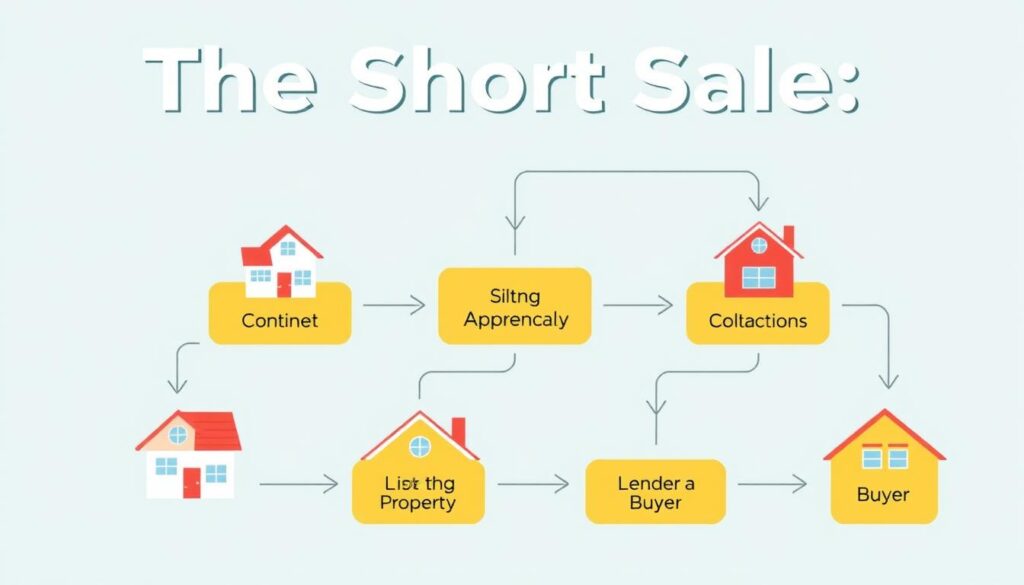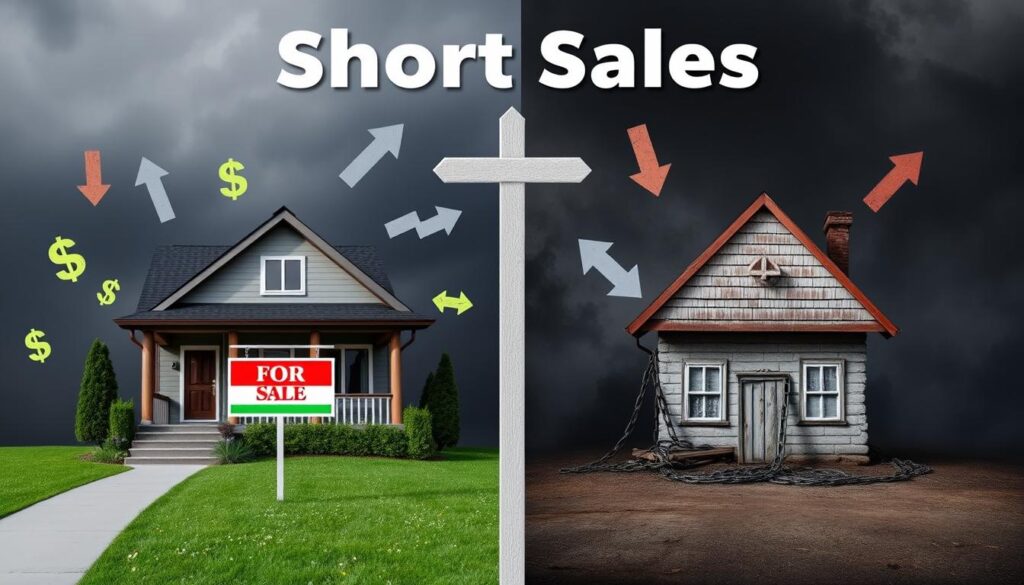Ever wondered about a short sale on a house? It’s not just a simple deal. A short sale happens when a homeowner sells their house for less than the mortgage debt, with the lender’s okay. This affects the homeowner, buyers, and the real estate market.
We’ll dive into short sales in real estate. We’ll cover what makes a sale a short sale, the process, and its effects on sellers and buyers. This includes the world of short sale real estate.
Key Takeaways
- A short sale allows lenders to accept less than the total mortgage owed to facilitate a timely sale.
- Short sales can remain on credit reports and could impact scores differently compared to foreclosures.
- Homeowners involved in short sales typically remain in their homes during the sale process.
- Sellers may benefit from avoiding foreclosure, which lessens damage to their credit profile.
- Buyers can potentially find properties at lower prices due to reduced competition.
- While complex, understanding the short sale process can lead to worthwhile opportunities for buyers and sellers alike.
What is a Short Sale on a House
Understanding a short sale is key for homeowners facing financial troubles. A short sale happens when a house sells for less than the mortgage debt. The lender then agrees to accept this lower price to cut their losses. This usually happens when a homeowner can’t pay their mortgage, leading to foreclosure.
Before agreeing, lenders check if the homeowner really can’t pay. They make sure there’s a valid reason for the hardship.
Definition and Overview
A short sale is a complex deal between the homeowner and the lender. Homeowners know they won’t get any money from the sale. The lender decides on the sale price, not the homeowner.
The process can take 4 to 6 months, but sometimes longer. Lenders face big losses, like when a $350,000 mortgage results in a $260,000 sale. This means they lose $90,000, showing the risks involved.
Key Indicators
There are signs that a homeowner might need a short sale. These include:
- Missed mortgage payments
- Big drops in property value
- Severe financial trouble
Choosing a short sale can help avoid foreclosure. It can also hurt the seller’s credit score less than foreclosure. However, lenders might ask the homeowner to pay back the difference in the mortgage.
Buyers should be flexible when looking at short sales. The lender’s approval can take longer than usual.
The Short Sale Process
The short sale process involves several key steps for homeowners and buyers. It’s important to know these steps to manage expectations and timelines. It starts when a homeowner talks to their lender about selling for less than the mortgage balance.
Then, the homeowner makes a detailed short sale proposal. This proposal explains their financial struggles and why they need to sell. After finding a buyer, the lender reviews the offer before agreeing to move forward.
Step-by-Step Approach
Starting a short sale can be tricky. Here are the main steps:
- Homeowner contacts lender to discuss a short sale.
- Prepare a short sale proposal, detailing financial hardship.
- Find a buyer and submit an offer to the lender.
- Lender reviews the offer and requests more information.
- Receive lender approval before finalizing the sale.
Keeping in touch with the lender is key, often weekly. Each step can take time, with short sales taking 90 to 120 days for approval.
Documentation Requirements
To buy a short sale property, sellers need to gather important financial documents. These include:
- Recent pay stubs
- Bank statements
- Tax returns
- A hardship letter explaining the situation
These documents are crucial for the lender’s review. Without them, approval can be delayed, making the wait longer. Sellers must be honest about their financial struggles, as this helps the lender decide.

For more details on this complex short sale process, understanding the benefits and challenges is key for buyers.
Short Sale vs Foreclosure
It’s important for homeowners to know the difference between short sales and foreclosures. Both happen when someone can’t pay their mortgage. But they have different ways of handling the situation. A short sale means selling the house for less than what’s owed, with the lender’s okay. Foreclosure is when the lender takes the house back because of missed payments.
Comparative Analysis
Homeowners usually have more say in a short sale. It’s a team effort, aiming for a win-win. Lenders like short sales because they save money and avoid long legal battles. Here’s a quick look at how they differ:
| Aspect | Short Sale | Foreclosure |
|---|---|---|
| Initiation | Voluntary by homeowner | Involuntary by lender |
| Timeframe | Typically shorter process | Average of 941 days in the U.S. |
| Credit Impact | Less severe; reported as settled debt | More severe; remains on report for up to seven years |
| Future Home Purchase | Shorter waiting period | Typically around five years |
| Deficiency Forgiveness | Possible forgiveness | Generally not applicable |
Impact on Credit Score
Short sales and foreclosures can hurt your credit score a lot. A short sale is seen as a settled debt, which is less bad for your score. But a foreclosure stays on your report for up to seven years, making it hard to get loans later. People who do short sales can recover faster than those who face foreclosure. For more info, check out this resource.
Advantages and Disadvantages of Short Sales
Understanding short sales is key for sellers and buyers. Knowing the pros and cons helps make smart choices. Sellers see benefits, while buyers face challenges when buying a short sale property.
Benefits for Sellers
Short sales help sellers avoid foreclosure’s harsh effects. They can recover faster from credit score drops and save money. Lenders might forgive part of the mortgage debt after a short sale.
Sellers can also stay in their homes during the process. This is a big difference from foreclosure, where they might lose their home quickly.
Challenges for Buyers
Buying a short sale can offer great deals. Buyers might get homes for less than market value. This can help them buy more house and build equity quickly.
But, there are downsides. Short sales take longer to close, often months. Buyers face delays due to lender negotiations. They also have to deal with properties sold “as is,” meaning they must find and fix any problems.
Buyers have little room to negotiate prices or get concessions. Lenders are careful about losses, which limits buyer power. Agents with short sale experience are rare. Listings can be hard to find, especially in good housing markets.

Conclusion
Knowing about short sales is key for homeowners in trouble and investors. A short sale helps homeowners avoid foreclosure, which can take months to a year. It’s a good option but needs lender help and can have legal, credit, and tax issues.
For buyers, short sales need careful research. These homes are sold as-is, which might mean extra costs for repairs. The lower price is attractive, but buyers must check the deal and get lender approval. With the right help, sellers and buyers can handle the short sale process well. For more info, check out short sale procedures.
Homeowners should look at all options before choosing a short sale. Knowing the debt and loan types is important. With the right knowledge, everyone can face the challenges and benefits of short sales.






